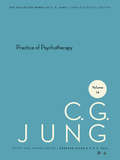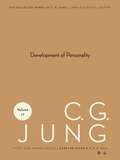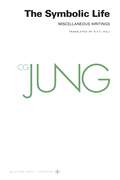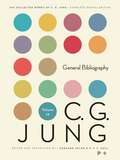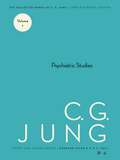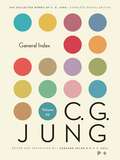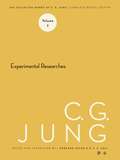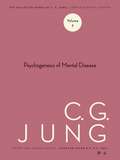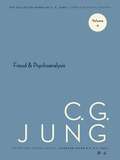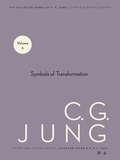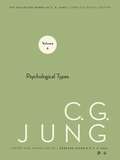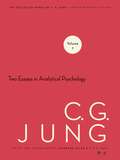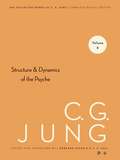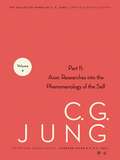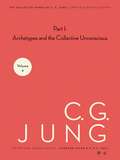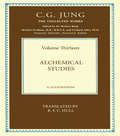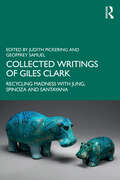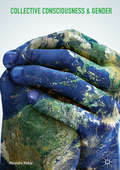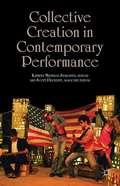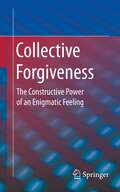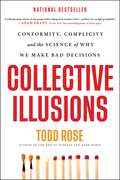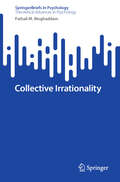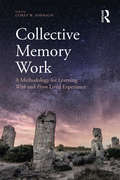- Table View
- List View
Collected Works of C. G. Jung, Volume 16: Practice of Psychotherapy (The Collected Works of C. G. Jung #52)
by C. G. JungEssays on aspects of analytical therapy, specifically the transference, abreaction, and dream analysis. Contains an additional essay, "The Realities of Practical Psychotherapy," found among Jung's posthumous papers.
Collected Works of C. G. Jung, Volume 17: Development of Personality (The Collected Works of C. G. Jung #58)
by C. G. JungPapers on child psychology, education, and individuation, underlining the overwhelming importance of parents and teachers in the genesis of the intellectual, feeling, and emotional disorders of childhood. The final paper deals with marriage as an aid or obstacle to self-realization.
Collected Works of C. G. Jung, Volume 18: The Symbolic Life: Miscellaneous Writings (The Collected Works of C. G. Jung #53)
by C. G. JungThe authoritative edition of Jung’s miscellaneous collected writingsThe Symbolic Life gathers some 160 of Jung’s writings that span sixty years and reflect his inquiring mind, numerous interests, and wide circle of professional and personal acquaintance. These writings include three longer works, “The Symbolic Life,” “Symbols and the Interpretation of Dreams,” and “The Tavistock Lectures”; a number of previously overlooked reviews, reports, and articles from the early years of Jung’s career; several finished or virtually finished manuscripts that weren’t published in his lifetime, including a 1901 report on Freud’s On Dreams; and works Jung wrote after retiring from active medical practice. The other pieces collected here include forewords to books by colleagues and pupils, replies to journalists’ questions, encyclopedia articles, and letters on technical subjects.
Collected Works of C. G. Jung, Volume 19: General Bibliography - Revised Edition (The Collected Works of C. G. Jung #54)
by C. G. JungAn authoritative bibliography of Jung’s works in German and EnglishA record of all of Jung’ s publications in German and in English, this volume replaces the general bibliography published in 1979 as Volume 19 of the Collected Works of C. G. Jung. In the form of a checklist, this revised general bibliography records through 1990 the initial publication of each original work by Jung, each translation into English, and all significant new editions, including paperbacks and publications in periodicals. The contents of the volumes of the Collected Works of C. G. Jung and the Gesammelte Werke (published in Switzerland) are listed in parallel to show the relation between the two editions. Jung’s seminars are dealt with in detail and, where possible, information is provided about the origin of works that were first conceived as lectures. There are indexes of all publications, personal names, organizations and societies, and periodicals.
Collected Works of C. G. Jung, Volume 1: Psychiatric Studies (The Collected Works of C. G. Jung #42)
by C. G. JungThe authoritative edition of early psychiatric studies by Jung, which foreshadow much of his later workPsychiatric Studies gathers writings on descriptive and experimental psychiatry that Jung published between 1902 and 1905, early in his career as a psychiatrist. The book opens with a study that foreshadows much of his later work and is indispensable to all serious students of his psychiatric career. This is his medical-degree dissertation, “On the Psychology and Pathology of So-called Occult Phenomena,” a detailed analysis of the case of an adolescent girl who professed to be a medium. This volume also includes papers on cryptomnesia, hysterical parapraxes in reading, manic mood disorder, simulated insanity, and other subjects.
Collected Works of C. G. Jung, Volume 20: General Index (The Collected Works of C. G. Jung #55)
by C. G. JungThe detailed general index to the authoritative English-language edition of Jung’s worksThis general index to the Collected Works of C. G. Jung is exceptionally comprehensive, indexing down to paragraph numbers. Some particularly important subjects are treated in subindexes, including alchemy, animals, the Bible, colors, Freud, Jung, and numbers. This is an essential reference tool for serious students of Jung.
Collected Works of C. G. Jung, Volume 2: Experimental Researches (The Collected Works of C. G. Jung #43)
by C. G. JungThe authoritative edition of Jung’s important early writings on his word-association experimentsAfter joining the staff of the Burghölzli Mental Hospital in 1900, Jung developed and applied word-association tests for studying normal and abnormal psychology. Between 1904 and 1907, he published nine studies on these experiments. Experimental Researches features these studies, as well as two lectures on the association method that Jung gave in 1909 when he and Freud were invited to Clark University in Worcester, Massachusetts, and three articles on psychophysical researches. Jung’s word-association studies are a significant phase in the development of his thought and an important contribution to diagnostic psychology and psychiatry.
Collected Works of C. G. Jung, Volume 3: The Psychogenesis of Mental Disease (The Collected Works of C. G. Jung #44)
by C. G. JungThe authoritative edition of some of Jung&’s most important writings on psychiatryThe Psychogenesis of Mental Disease presents some of Jung&’s most important writings on psychiatry, including &“On the Psychology of Dementia Praecox," his landmark early study of what is today called schizophrenia. Also featured here are nine other key papers in psychiatry, the earliest being &“The Content of the Psychoses,&” written in 1908, when Jung was a leading member of the early psychoanalytic movement. The latest are two papers written in 1956 and 1958, which embody Jung&’s conclusions after many years of experience in the psychotherapy of schizophrenia. These writings reflect the original techniques with which Jung is especially associated.
Collected Works of C. G. Jung, Volume 4: Freud and Psychoanalysis (The Collected Works of C. G. Jung #45)
by C. G. JungThe authoritative edition of Jung&’s essential writings for understanding his early enthusiasm for—and later split with—Freud and psychoanalysisFreud and Psychoanalysis gathers Jung&’s writings on Freud and psychoanalysis published between 1906 and 1916, along with two later, related papers. The book covers the period of the enthusiastic collaboration between the two pioneers of psychology through the years when Jung&’s growing appreciation of religious experience, his criticism of Freud&’s emphasis on pathology, and other differences led to Jung&’s formal break with his mentor. Part I features brief studies of Freud&’s theory of hysteria, dream analysis, the psychology of rumor, and other subjects. Parts II and III contain the essentials of the criticism that led to Jung&’s rupture with Freud, the most important of which is &“The Theory of Psychoanalysis.&” Part IV presents &“The Significance of the Father in the Destiny of the Individual.&” The book&’s final two pieces, &“Freud and Jung: Contrasts&” and the introduction to a book by W. M. Kranefeldt, further illuminate Jung&’s reassessment of psychoanalysis.
Collected Works of C. G. Jung, Volume 5: Symbols of Transformation (The Collected Works of C. G. Jung #46)
by C. G. JungA complete revision of Psychology of the Unconscious (orig. 1911-12), Jung's first important statement of his independent position.
Collected Works of C. G. Jung, Volume 6: Psychological Types (The Collected Works of C. G. Jung #38)
by C. G. JungOne of the most important of Jung's longer works, and probably the most famous of his books, Psychological Types appeared in German in 1921 after a "fallow period" of eight years during which Jung had published little. He called it "the fruit of nearly twenty years' work in the domain of practical psychology," and in his autobiography he wrote: "This work sprang originally from my need to define the ways in which my outlook differed from Freud's and Adler's. In attempting to answer this question, I came across the problem of types; for it is one's psychological type which from the outset determines and limits a person's judgment. My book, therefore, was an effort to deal with the relationship of the individual to the world, to people and things. It discussed the various aspects of consciousness, the various attitudes the conscious mind might take toward the world, and thus constitutes a psychology of consciousness regarded from what might be called a clinical angle." In expounding his system of personality types Jung relied not so much on formal case data as on the countless impressions and experiences derived from the treatment of nervous illnesses, from intercourse with people of all social levels, "friend and foe alike," and from an analysis of his own psychological nature. The book is rich in material drawn from literature, aesthetics, religion, and philosophy. The extended chapters that give general descriptions of the types and definitions of Jung's principal psychological concepts are key documents in analytical psychology.
Collected Works of C. G. Jung, Volume 7: Two Essays in Analytical Psychology (The Collected Works of C. G. Jung #41)
by C. G. JungThis volume has become known as perhaps the best introduction to Jung's work. In these famous essays. "The Relations between the Ego and the Unconscious" and "On the Psychology of the Unconscious," he presented the essential core of his system. Historically, they mark the end of Jung's intimate association with Freud and sum up his attempt to integrate the psychological schools of Freud and Adler into a comprehensive framework. This is the first paperback publication of this key work in its revised and augmented second edition of 1966. The earliest versions of the Two Essays, "New Paths in Psychology" (1912) and "The Structure of the Unconscious" (1916), discovered among Jung's posthumous papers, are published in an appendix, to show the development of Jung's thought in later versions. As an aid to study, the index has been comprehensively expanded.
Collected Works of C. G. Jung, Volume 8: The Structure and Dynamics of the Psyche (The Collected Works of C. G. Jung #47)
by C. G. JungAn authoritative collection of Jung’s writings on analytical psychology, including SynchronicityThe Structure and Dynamics of the Psyche features a selection of Jung’s writings, ranging over four decades of his career, which illustrate the development of the conceptual foundations of analytical psychology. These pieces span the period from Jung’s break with Freud and the psychoanalytical school, when Jung began formulating his own theories, to the 1950s, when he published an account of his controversial theory of synchronicity.The contents are: On Psychic Energy • The Transcendent Function • A Review of the Complex Theory • The Significance of Constitution and Heredity in Psychology • Psychological Factors Determining Human Behavior • Instinct and the Unconscious • The Structure of the Psyche • On the Nature of the Psyche • General Aspects of Dream Psychology • On the Nature of Dreams • The Psychological Foundation of Belief in Spirits • Spirit and Life • Basic Postulates of Analytical Psychology • Analytical Psychology and Weltanschauung • The Real and the Surreal • The Stages of Life • The Soul and Death • Synchronicity: An Acausal Connecting Principle • On Synchronicity
Collected Works of C. G. Jung, Volume 9: Aion: Researches into the Phenomenology of the Self (The Collected Works of C. G. Jung #56)
by C. G. JungAion, originally published in German in 1951, is one of the major works of Jung's later years. The central theme of the volume is the symbolic representation of the psychic totality through the concept of the Self, whose traditional historical equivalent is the figure of Christ. Jung demonstrates his thesis by an investigation of the Allegoria Christi, especially the fish symbol, but also of Gnostic and alchemical symbolism, which he treats as phenomena of cultural assimilation. The first four chapters, on the ego, the shadow, and the anima and animus, provide a valuable summation of these key concepts in Jung's system of psychology.
Collected Works of C. G. Jung, Volume 9: Archetypes and the Collective Unconscious (The Collected Works of C. G. Jung #48)
by C. G. JungEssays which state the fundamentals of Jung's psychological system: "On the Psychology of the Unconscious" and "The Relations Between the Ego and the Unconscious," with their original versions in an appendix.
Collected Works of C.G. Jung: Alchemical Studies (Collected Works of C.G. Jung #51)
by C.G. JungThe psychological and religious implications of alchemy were Jung's major preoccupation during the last thirty years of his life. The essays composing the present volume complete the publication of his alchemial researches, to which three entire volumes have been devoted ^DDL the monumental Mysterium Coniunctionis, Psychology and Alchemy, and Aion ^DDL besides shorter papers in other volumes. This collection of shorter Alchemial Studies has special value as an introduction to Jung's work on alchemy. The first study, on Chinese alchemy, marked the beginning of his interest in the subject, and was originally published in a volume written jointly with Richard Wilhelm. The other four are now published for the first time completely in English.
Collected Writings of Giles Clark: Recycling Madness with Jung, Spinoza and Santayana
by Geoffrey Samuel Judith PickeringThis timeless and thought-provoking volume makes available the collected writings of Giles Clark (1947–2019), whose original clinical theory constitutes a major contribution to the areas of analytical psychology, psychoanalysis and philosophy. Clark’s work influenced generations of analytical psychologists, psychoanalytic psychotherapists and trainees in England, Australia and elsewhere. His oeuvre covers important themes such as psychoanalysis as a deeply relational, mutually transformative and intersubjective endeavor; how, as wounded healers, analysts learn the art of recycling their own madness so as better to assist their patients; the clinical treatment of borderline and narcissistic disturbances and personality disorders; and psychosomatic issues as manifest and experienced in transference and countertransference relations in the analytic field. The book also explores the relevance of Spinoza, Santayana, Jung and German Romantic philosophers to analytical psychology and psychoanalysis, not merely in historical or theoretical terms but as a vital resource to guide clinical practice as demonstrated through a series of compelling case studies. The Collected Writings of Giles Clark is of great interest to Jungian analysts, analytical psychologists and psychotherapists in practice and in training, as well as anyone interested in understanding the interface between depth psychology, philosophy and neuropsychology, and in the mind-body problem more generally.
Collecting Sexual Orientation and Gender Identity Data in Electronic Health Records
by Joe AlperCollecting Sexual Orientation and Gender Identity Data in Electronic Health Records: Workshop Summary reviews the statement of task set to the committee which required them to collect sexual orientation and gender identity data in electronic health records. This report summarizes the invited presentations and facilitated discussions about current practices around sexual orientation and gender identity data collection, the challenges in collecting these data, and ways in which these challenges can be overcome. Areas of focus for the workshop include the clinical rationale behind collecting these data, standardized questions that can be used to collect these data, mechanisms for supporting providers and patients in the collection of these data, technical specifications involved in creating standards for sexual orientation and gender identity data collection and exchange, and policy considerations related to the health information technology (HIT) Meaningful Use process being overseen by the Department of Health and Human Services. This report summarizes the workshop agenda, select invited speakers and discussants, and moderate the discussions. Invited participants will include lesbian, gay, bisexual, and transgender (LGBT) health care consumer advocates, providers with experience working with LGBT populations, HIT vendors and other HIT specialists, health care administrators, and policy makers.
Collective Bargaining by Government Workers: The Public Employee (Public Sector Contemporary Issues #Vol. 3)
by Harry KershenThe chapters in this anthology deal with many of these all-encompassing constraints and how the various participants seek to deal with them. Model agreements, negotiating levers, the balance of power between managers and government employees, contracting-out versus producing in-house, the impact of bargaining unit structure on productivity, the relationship of municipal budget making to collective bargaining, public employee union growth and organizing trends, and many other topics are dealt with in this volume. These issues are discussed in the context of several specific types of public employees such as: municipal protection employees, mass transit workers, health professionals in relation to government service, and, the armed forces and civilian federal employees.
Collective Consciousness and Gender
by Alexandra WalkerThis book explores collective consciousness and how it is applied to the pursuit of gender justice in international law. It discusses how the collective mode of behaviour and identity can lead to unconscious role-playing based on the social norms, expectations or archetypes of a group. Alexandra Walker contends that throughout history, men have been constructed as archetypal dominators and women as victims. In casting women in this way, we have downplayed their pre-existing, innate capacities for strength, leadership and power. In casting men as archetypal dominators, we have downplayed their capacities for nurturing, care and empathy. The author investigates the widespread implications of this unconscious role-playing, arguing that even in countries in which women have many of the same legal rights as men, gender justice and equality have been too simplistically framed as ‘feminism’ and ‘women’s rights’ and that giving women the rights of men has not created gender balance. This book highlights the masculine and feminine traits belonging to all individuals and calls on international law to reflect this gender continuum.
Collective Creation in Contemporary Performance
by Kathryn SyssoyevaThis edited volume situates its contemporary practice in the tradition which emerged at the beginning of the twentieth century. Collective Creation in Contemporary Performance examines collective and devised theatre practices internationally and demonstrates the prevalence, breadth, and significance of modern collective creation.
Collective Forgiveness: The Constructive Power of an Enigmatic Feeling
by Oliver ErrichielloIn this age of a hyper-complex and totally interconnected world that no longer knows pauses, forgiveness is essential. The author explains that collective forgiveness is in no way inferior to love in its mysteriousness. We humans are unfathomable beings. Although we usually act thoughtfully and rationally, many actions and decisions cannot seem to be logically derived. Forgiveness - everyone knows it and has experienced it - is one of them. Forgiveness is one of the most important and exciting phenomena of human communication. The book answers questions such as: Why do we forgive some people and not others? Why does forgiveness take time? Why have people always forgiven each other - or rejected the very act of forgiving? Do we forgive individuals in a personal environment more easily or we more hesitant than with a group of people? And most importantly, why is collective forgiveness effective across time and cultures? The book is thought-provoking and offers valuable impulses to better understand one's own and social actions.This book is a translation of the original German 1st edition Kollektives Verzeihen by Oliver Errichiello, published by Springer-Verlag GmbH, DE, part of Springer Nature in 2021. The translation was done with the help of artificial intelligence (machine translation by the service DeepL.com). A subsequent human revision was done primarily in terms of content, so that the book will read stylistically differently from a conventional translation. Springer Nature works continuously to further the development of tools for the production of books and on the related technologies to support the authors.
Collective Illusions: Conformity, Complicity, and the Science of Why We Make Bad Decisions
by Todd RoseDrawing on cutting-edge neuroscience and social psychology research, an acclaimed author demonstrates how so much of our thinking is informed by false assumptions—making us dangerously mistrustful as a society and needlessly unhappy as individuals. The desire to fit in is one of the most powerful, least understood forces in society. Todd Rose believes that as human beings, we continually act against our own best interests because our brains misunderstand what others believe. A complicated set of illusions driven by conformity bias distorts how we see the world around us. From toilet paper shortages to kidneys that get thrown away rather than used for transplants; from racial segregation to the perceived &“electability&” of women in politics; from bottled water to &“cancel culture,&” we routinely copy others, lie about what we believe, cling to tribes, and silence people. The question is, Why do we keep believing the lies and hurting ourselves? Todd Rose proves that the answer is hard-wired in our DNA: our brains are more socially dependent than we realize or dare to accept. Most of us would rather be fully in sync with the social norms of our respective groups than be true to who we are. Using originally researched data, Collective Illusions shows us where we get things wrong and, just as important, how we can be authentic in forming opinions while valuing truth. Rose offers a counterintuitive yet empowering explanation for how we can bridge our inference gap, make decisions with a newfound clarity, and achieve fulfillment. **National Bestseller** **Wall Street Journal Bestseller** **Named Amazon's 2022 Best Book of the Year in Business, Leadership, and Science**
Collective Irrationality (SpringerBriefs in Psychology)
by Fathali M. MoghaddamThe goal of this book is to provide, first, a critical discussion of collective irrationality from the perspectives of different research traditions in psychological science and, second, introduce a forward- looking theory of collective irrationality, one that will help stimulate greater attention to this topic on the part of researching and practicing psychologists. Collective irrationality is a neglected topic in mainstream psychology. Individual irrationality has been extensively examined from different research perspectives, most recently through the lens of cognitive neuroscience, but collective irrationality continues to be ignored. This is in large part due to the reductionism of mainstream psychology, dominated as it is by the individualistic culture of the United States. However, the most serious challenges confronting humankind, including global warming and nuclear proliferation, arise out of collective irrationality, which is in a number of important ways different from individual irrationality. Thus, the neglect of collective irrationality represents an important gap that this work will help fill.
Collective Memory Work: A Methodology for Learning With and From Lived Experience
by Corey W. JohnsonThe seemingly mundane events of daily life create a complex knowledge base of lived experience to be explored. But how does one research common experiences and account for context, culture, and identity? A dilemma arises because experience is not just embedded in events, but also in the socially constructed meanings associated with those events. This book details the philosophical underpinnings, design features and implementation strategies of Collective Memory Work – a methodology frequently employed by social justice activists/scholars. Collective Memory Work can provide scholars with unique and nuanced ways to solve problems for and with their participants. Most importantly, the chapters also detail projects and social justice in action, analysing their participants’ real stories and experiences: projects that focus on LGBTQ youth, #blacklivesmatter activists, white faculty working at historically Black colleges and universities, men’s media consumption and much more. Written in an engaging and accessible style, readers will come to understand the potential of their own qualitative research using Collective Memory Work.
